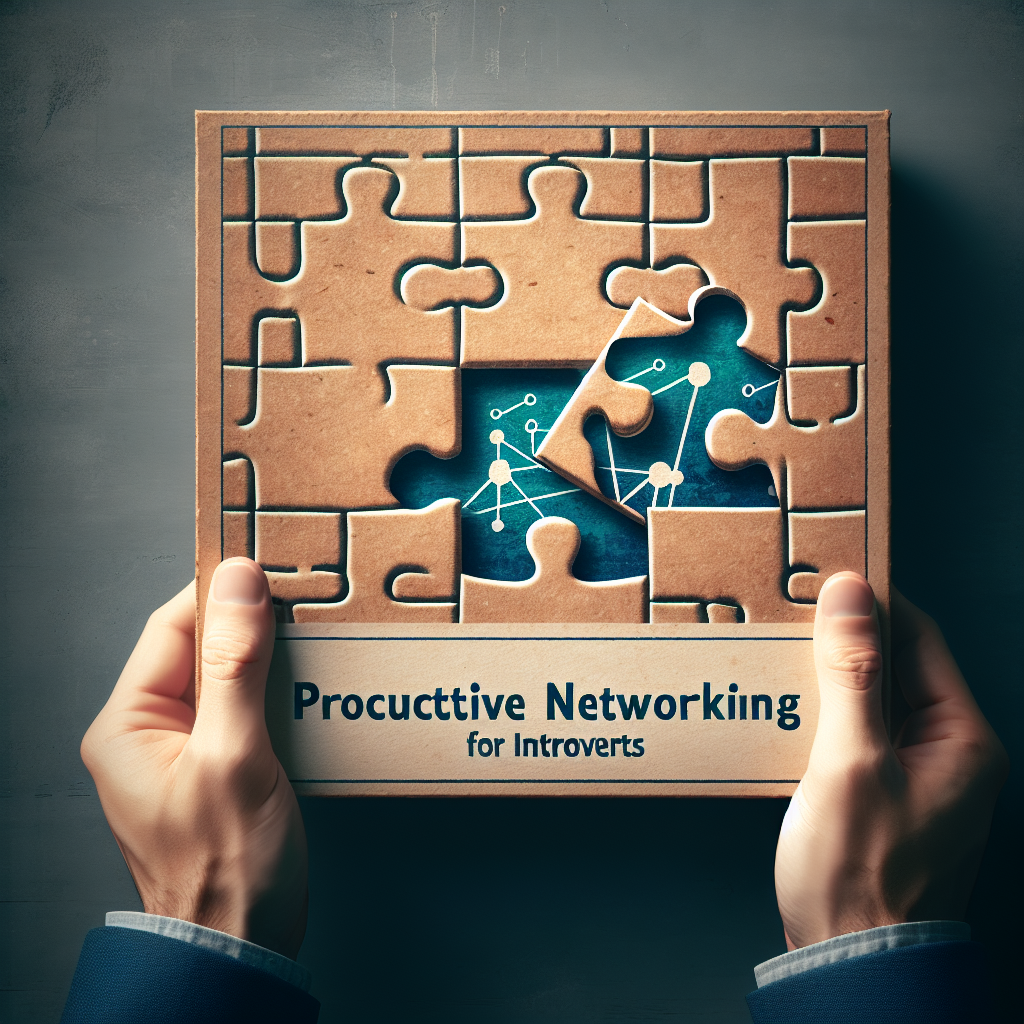Are you an introvert looking to improve your networking skills? In this article, we will explore practical tips and strategies that can help you develop effective networking skills, even if you find socializing and meeting new people challenging. Whether it’s attending networking events, making connections online, or building relationships in your workplace, we’ve got you covered. Get ready to step out of your comfort zone and unlock the power of networking as an introvert.
- Understanding Introversion and Networking
- Preparing for Networking Events
- Mastering the Art of Small Talk
- Making a Positive First Impression
- Overcoming Nervousness and Anxiety
- Building Authentic Connections
- Finding Common Ground
- Utilizing Online Networking Platforms
- Navigating Large Networking Events
- Utilizing Follow-Up Strategies
Understanding Introversion and Networking
Defining introversion
Introversion is often misunderstood and is commonly misinterpreted as shyness or a lack of social skills. However, introversion is actually a personality trait characterized by a preference for solitude and a need for quiet and calm environments to recharge. Introverts gain their energy from internal reflection and introspection, rather than external stimuli like social interactions.
Exploring the challenges introverts face in networking
Networking can be a particularly daunting task for introverts. The idea of engaging in small talk, approaching strangers, and navigating large networking events can cause anxiety and stress for introverted individuals. The pressure to constantly be outgoing and assertive can feel overwhelming and draining for introverts who thrive in quieter and more introspective settings.
Recognizing the importance of networking for introverts
While networking may seem like an activity geared more towards extroverted individuals, it is essential for introverts as well. Networking allows individuals to expand their professional contacts, gain new opportunities, and learn from others in their field. By recognizing the importance of networking and finding strategies to navigate these situations, introverts can unlock new doors and enrich their careers.
Preparing for Networking Events
Researching the event and attendees
One of the keys to feeling more at ease at networking events as an introvert is to come prepared. Before attending an event, take the time to research the event itself, including the agenda, speakers, and topics being discussed. Additionally, if the attendee list is available, take the opportunity to learn more about who will be attending. This will not only provide you with conversation starters but will also help you identify individuals you may want to connect with.
Setting clear goals for the event
Setting clear goals before attending a networking event can help introverts focus their energy and make the most of their time. Whether it’s aiming to meet a certain number of new people, having specific questions to ask, or seeking out individuals in specific industries, having goals in mind will provide a sense of direction and purpose.
Creating an elevator pitch
Crafting an elevator pitch is an essential tool for introverts to have in their networking toolkit. An elevator pitch is a brief, compelling description of yourself and what you do, designed to create interest and intrigue in just a few short sentences. By preparing and practicing your elevator pitch beforehand, you’ll feel more confident when introducing yourself and engaging in conversations with others.

Mastering the Art of Small Talk
Understanding the purpose of small talk
Small talk often gets a bad reputation, but it serves an important purpose in networking. It helps establish rapport, break the ice, and create a comfortable atmosphere. As an introvert, it can be helpful to reframe small talk as an opportunity to learn more about others, their interests, and their experiences. By focusing on this aspect, small talk becomes less intimidating and more meaningful.
Learning to initiate conversations
Initiating conversations can be a challenge for introverts, but it’s a crucial skill to develop in networking situations. One effective tactic is to approach individuals who are standing alone or in smaller groups, as they may be more open to conversations. Additionally, using open-ended questions as conversation starters can help to keep the dialogue flowing and encourage more in-depth discussions.
Developing active listening skills
Active listening is a valuable skill for introverts to develop when networking. It involves fully engaging with the speaker, demonstrating interest by maintaining eye contact, nodding, and providing verbal cues. By actively listening, introverts can show genuine interest in others and create a more engaging and authentic conversation.
Making a Positive First Impression
Presenting a confident body language
Body language plays a significant role in making a positive first impression. As an introvert, it’s important to be mindful of your body language and project confidence. Stand tall, maintain good posture, and make eye contact with others. Avoid crossing your arms, which can make you appear closed off, and instead, keep your body language open and welcoming.
Dressing appropriately for the occasion
Dressing appropriately for a networking event demonstrates professionalism and respect for the occasion. While attire may vary depending on the specific event, it’s always a good idea to dress slightly more formal than the expected dress code. This shows that you take the event seriously and are committed to making a good impression.
Practicing good hygiene and grooming
Personal hygiene and grooming should never be overlooked when attending networking events. A neat and well-groomed appearance not only helps create a positive impression but also boosts your self-confidence. Take the time to ensure your hair, nails, and attire are clean and presentable. Fresh breath and proper personal hygiene are also non-negotiables when interacting closely with others.

Overcoming Nervousness and Anxiety
Utilizing relaxation techniques
Nervousness and anxiety are common emotions experienced by introverts in networking situations. One way to overcome these feelings is by utilizing relaxation techniques. Deep breathing exercises, visualization, and mindfulness can help calm the mind and alleviate anxiety. Incorporating these techniques into your pre-networking routine can help you approach events with a sense of calm and confidence.
Having positive self-talk
Positive self-talk involves consciously replacing negative thoughts with positive and empowering ones. Remind yourself of your strengths, accomplishments, and previous successful networking experiences. This shift in mindset can alleviate self-doubt and boost your confidence, allowing you to fully embrace networking opportunities.
Gradually exposing oneself to networking situations
Like any skill, networking becomes easier with practice. Instead of avoiding networking events altogether, gradually expose yourself to these situations to build your comfort level. Start by attending smaller events or networking with individuals you’re already familiar with. As you become more comfortable, gradually challenge yourself by attending larger events and reaching out to new contacts.
Building Authentic Connections
Showing genuine interest in others
Authentic connections are built upon genuine interest and curiosity about others. As an introvert, your natural inclination to listen and observe can be a valuable asset in forming meaningful connections. Ask open-ended questions that encourage others to share their experiences and passions. By actively listening and showing genuine interest, you’ll create a stronger connection with the individuals you meet.
Asking open-ended questions
Open-ended questions are an effective way to engage in deeper and more meaningful conversations. Instead of asking yes or no questions, ask questions that invite the other person to share their thoughts, experiences, or opinions. This demonstrates your interest in their perspective and promotes a more engaging dialogue.
Sharing personal stories and experiences
Sharing personal stories and experiences can help foster a deeper connection with others. As an introvert, you may find it more comfortable to share insights and experiences from your own life rather than engaging in small talk. By opening up and sharing, you create an opportunity for others to relate to you on a more personal level and form a stronger bond.

Finding Common Ground
Identifying shared interests or hobbies
Finding common ground is an effective way to establish a connection with others. When engaging in conversations, look for shared interests or hobbies that you can discuss. This not only helps to build rapport but also creates a more comfortable and enjoyable networking experience for both parties.
Researching attendees to find common ground
If possible, research the attendees before the event to find common ground or shared connections. Social media platforms like LinkedIn can provide valuable insights into individuals’ professional backgrounds and interests. By identifying commonalities, you can strategically approach conversations and establish a connection more easily.
Joining groups or associations with similar interests
To expand your networking opportunities, consider joining groups or associations that align with your interests or professional goals. By participating in these communities, you’ll have the chance to network with like-minded individuals who share common goals and passions. This provides a more natural and comfortable environment for introverts to develop connections.
Utilizing Online Networking Platforms
Exploring professional social media platforms
Professional social media platforms like LinkedIn can be invaluable tools for introverts to connect with others in their field. Take the time to create a complete and compelling profile that showcases your skills and experiences. Actively engage with others by joining relevant groups, participating in discussions, and sharing valuable insights. This allows you to build your network and establish connections without the pressure of face-to-face interactions.
Engaging in online communities and forums
Online communities and forums provide an excellent platform for introverts to connect with individuals who share similar interests or professional goals. Participate in relevant discussions, ask questions, and offer insights or advice. By actively engaging in these communities, you’ll increase your visibility and have the opportunity to form connections with like-minded individuals.
Participating in virtual networking events
In recent years, virtual networking events have become increasingly popular, providing an excellent opportunity for introverts to network from the comfort of their own homes. These events typically involve small group discussions or one-on-one conversations facilitated through video conferencing platforms. Participating in virtual networking events allows introverts to engage in a more controlled and less overwhelming environment.
Navigating Large Networking Events
Creating a game plan and schedule
Large networking events can be overwhelming, especially for introverts. To navigate these events effectively, create a game plan and schedule in advance. Identify key individuals or booths you want to visit, prioritize the sessions or workshops you wish to attend, and allocate time for breaks to recharge. By having a clear plan, you’ll feel more organized and in control.
Approaching groups and conversations
Approaching groups or conversations can be intimidating, especially if you don’t know anyone. A helpful approach is to observe the group dynamics and identify an opportunity to contribute or engage. Wait for a pause in the conversation or introduce yourself to someone who appears approachable. Remember, everyone is there to network, and most individuals will welcome new connections.
Managing time effectively
Time management is crucial when navigating large networking events. With numerous sessions, workshops, and conversations happening simultaneously, it’s easy to feel overwhelmed and miss out on valuable opportunities. Plan your time strategically, allowing for breaks and opportunities to connect while still attending the sessions that align with your goals.
Utilizing Follow-Up Strategies
Sending personalized follow-up emails or messages
After attending a networking event, take the time to follow up with the individuals you connected with. Sending personalized follow-up emails or messages expressing your appreciation for the conversation and sharing any relevant resources or insights reinforces the connection you established. This gesture demonstrates professionalism and can lead to further opportunities for collaboration or discussion.
Connecting on professional networking platforms
In addition to email or messages, connecting on professional networking platforms like LinkedIn is an excellent way to stay connected with individuals you’ve met at networking events. Sending a personalized connection request, accompanied by a brief reminder of where you met or what you discussed, helps solidify the connection and provides an opportunity to continue building the relationship.
Scheduling one-on-one meetings or coffee chats
If you met someone at a networking event and established a strong connection, consider scheduling a one-on-one meeting or coffee chat. This allows for a more intimate and focused conversation, where you can delve deeper into each other’s interests, goals, or potential collaboration opportunities. These one-on-one interactions are often where the most meaningful and lasting connections are forged.
In conclusion, networking can be a valuable and rewarding experience for introverts. By understanding the challenges introverts face in networking and utilizing various strategies, introverts can effectively develop their networking skills. From preparing for networking events to building authentic connections and utilizing online platforms, introverts can thrive in the networking world, expanding their professional networks and unlocking new opportunities along the way. Remember, networking is about forging genuine connections, so embrace your introverted strengths and approach networking with authenticity, curiosity, and a willingness to learn from others.







